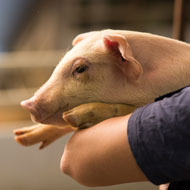
Organisation adopts list of ‘critical’ antibiotics
The Pig Veterinary Society (PVS) is to adopt the European Medicines Agency’s (EMA’s) list of highest-priority Critically Important Antibiotics (CIAs).
The announcement means that under PVS guidelines, fluoroquinolones, 3rd and 4th generation cephalosporins and Colistin will retain class three status.
This means they will only be used when no other options are available and when supported by laboratory sensitivity testing - or when all other options have failed.
The PVS states that its decision follows a review by its Medicines Sub-Committee, and coincides with a move last month from RUMA to align with the EMA position.
Mark White, PVS president commented: “The total amount of all antibiotics used on pig farms to treat and prevent disease should be minimised, and the types of antibiotics used in pigs should be considered in light of the implications for antibiotic resistance challenges in both pigs and man.
“This policy is proving successful with AHDB Pork’s electronic pig medicine book (e-MB) recently showing that use of colistin appears to have fallen by over 70 per cent in 2016 following its move to a Class 3 antibiotic in late 2015.
“We must also continue to be alert to the possibility of cross-resistance, even in older antibiotics that have little or no use in humans. Risk must be acknowledged where it exists and overall reductions are still imperative.”
In a statement, the PVS writes that antibiotics in Class 1 make up the standard prescribing list within responsible use guidelines. Class 2 should only be used when sensitivity tests or clinical experience proves standard antibiotics are not effective.
'In all treatment decisions, the health and welfare of the pigs must always take priority,' it adds.
The PVS has also reviewed the risk of beta-lactams with beta-lactamase inhibitors and has reclassified them from Class 3 to Class 2. This means they are still subject to voluntary restrictions, but their use would not necessarily be only as a last resort.
Welcoming the review, RUMA secretary general John FitzGerald said: “Farmers and vets need boundaries within which to operate and clear objectives to meet, and we would urge all supply chains, from farmer to retailer, to align with the sector position on best practice use of antibiotics, as defined by each sector’s professional veterinary organisation.”



 The latest
The latest